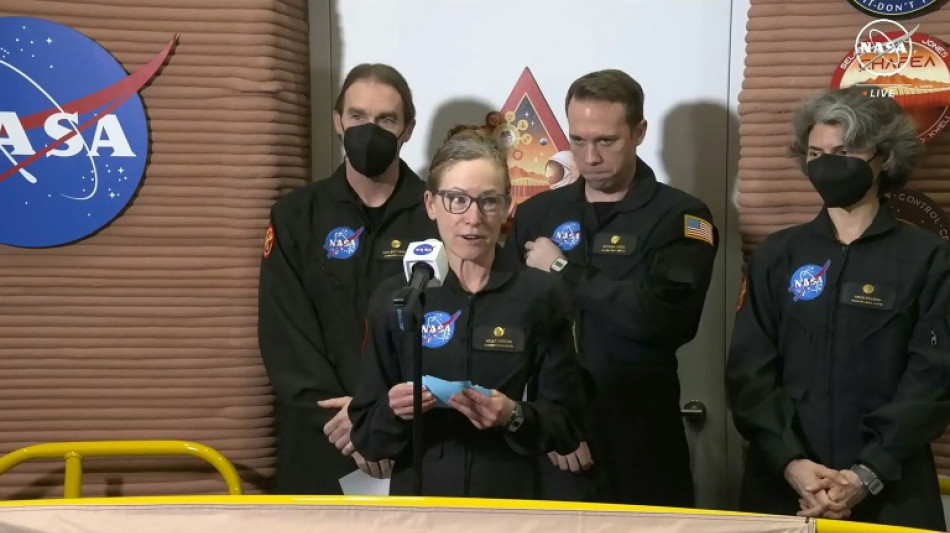
-
 Putin evokes WWII victory to rally Russia behind Ukraine offensive
Putin evokes WWII victory to rally Russia behind Ukraine offensive
-
China exports beat forecasts ahead of US tariff talks

-
 Leo XIV, the 'Latin Yankee', to celebrate first mass as pope
Leo XIV, the 'Latin Yankee', to celebrate first mass as pope
-
Most stocks lifted by hopes for US-China talks after UK deal

-
 IPL suspended indefinitely over India-Pakistan conflict: reports
IPL suspended indefinitely over India-Pakistan conflict: reports
-
German lender Commerzbank's profits jump as it fends off UniCredit

-
 Rare bone-eroding disease ruining lives in Kenya's poorest county
Rare bone-eroding disease ruining lives in Kenya's poorest county
-
India says repulsed fresh Pakistan attacks as de-escalation efforts grow

-
 Zhao's historic snooker title sparks talk of China world domination
Zhao's historic snooker title sparks talk of China world domination
-
'High expectations': EU looks to Merz for boost in tough times

-
 Poisoned guests rarely invited before deadly mushroom lunch, Australia trial hears
Poisoned guests rarely invited before deadly mushroom lunch, Australia trial hears
-
China sales to US slump even as exports beat forecasts

-
 Indian cricket to make 'final decision' on IPL over Pakistan conflict
Indian cricket to make 'final decision' on IPL over Pakistan conflict
-
Dethroned Bundesliga champions Leverkusen face uncertain future

-
 China can play hardball at looming trade talks with US: analysts
China can play hardball at looming trade talks with US: analysts
-
French monuments in trouble while PSG prepare for Champions League final

-
 Newcastle face Chelsea in top five showdown, Alexander-Arnold in spotlight
Newcastle face Chelsea in top five showdown, Alexander-Arnold in spotlight
-
Flick's Barca must show 'hunger' in crunch Liga Clasico

-
 Clasico the last chance saloon for Ancelotti's Real Madrid
Clasico the last chance saloon for Ancelotti's Real Madrid
-
Timberwolves overpower Warriors to level series

-
 Chinese fabric exporters anxious for US trade patch-up
Chinese fabric exporters anxious for US trade patch-up
-
Putin gears up to host world leaders at lavish army parade

-
 Nearing 100, Malaysian ex-PM Mahathir blasts 'old world' Trump
Nearing 100, Malaysian ex-PM Mahathir blasts 'old world' Trump
-
Leo XIV, first US pope, to celebrate first mass as pontiff

-
 Asian stocks lifted by hopes for US-China talks after UK deal
Asian stocks lifted by hopes for US-China talks after UK deal
-
Former head of crypto platform Celsius sentenced 12 years

-
 Ex-model testifies in NY court that Weinstein assaulted her at 16
Ex-model testifies in NY court that Weinstein assaulted her at 16
-
Genflow Biosciences PLC Announces Share Subscription, Director's Dealing and Update

-
 Argo Blockchain PLC Announces 2024 Annual Results and Restoration of Listing
Argo Blockchain PLC Announces 2024 Annual Results and Restoration of Listing
-
'Great honor': world leaders welcome first US pope

-
 Pacquiao to un-retire and fight Barrios for welterweight title: report
Pacquiao to un-retire and fight Barrios for welterweight title: report
-
Trump unveils UK trade deal, first since tariff blitz

-
 Man Utd one step away from Europa League glory despite horror season
Man Utd one step away from Europa League glory despite horror season
-
Jeeno shines on greens to grab LPGA lead at Liberty National

-
 Mitchell fires PGA career-low 61 to grab Truist lead
Mitchell fires PGA career-low 61 to grab Truist lead
-
AI tool uses selfies to predict biological age and cancer survival

-
 Extremely online new pope unafraid to talk politics
Extremely online new pope unafraid to talk politics
-
Postecoglou hits back as Spurs reach Europa League final

-
 Chelsea ease into Conference League final against Betis
Chelsea ease into Conference League final against Betis
-
Pope Leo XIV: Soft-spoken American spent decades amid poor in Peru

-
 First US pope shared articles critical of Trump, Vance
First US pope shared articles critical of Trump, Vance
-
'Inexcusable' - NBA champs Boston in trouble after letting big leads slip

-
 US automakers blast Trump's UK trade deal
US automakers blast Trump's UK trade deal
-
Stocks mostly rise as US-UK unveil trade deal

-
 Trump presses Russia for unconditional 30-day Ukraine ceasefire
Trump presses Russia for unconditional 30-day Ukraine ceasefire
-
Anything but Europa League glory 'means nothing' for Man Utd: Amorim

-
 'Inexcuseable' - NBA champs Boston in trouble after letting big leads slip
'Inexcuseable' - NBA champs Boston in trouble after letting big leads slip
-
Pope Leo 'fell in love with Peru'and ceviche: Peru bishop

-
 Pakistan's T20 cricket league moved to UAE over India conflict
Pakistan's T20 cricket league moved to UAE over India conflict
-
India tells X to block over 8,000 accounts


One year on 'Mars': Inside NASA's ultra-realistic isolation study
Sealed inside a habitat in Texas and cut off from the outside world for over a year, Kelly Haston was the commander of a first-of-its-kind simulation for NASA to prepare for a future mission to Mars.
From conducting mock "Marswalks" to tending to a vertical garden, and occasionally grappling with boredom -- Haston expressed pride in advancing the cause of space exploration while admitting the experience made her reconsider the reality of life on the Red Planet.
"Going to space would be an amazing opportunity," the 53-year-old biologist told AFP. "But I would say that it would be harder having experienced this, to know how it feels to leave your people."
The overarching goal of the experiment, called CHAPEA (Crew Health and Performance Exploration Analog) Mission 1, is to better understand the impacts of isolation on a crew's performance and health.
The project lasted 378 days and concluded in early July.
After all, a round-trip to Mars could easily take more than two years, factoring in the transit time of six-to-nine months and the time NASA hopes to spend on the planet.
For Haston, the hardest part was clear: "I could have been in that habitat for another year and survived with all of the other restrictions, but your people -- you miss your people so much."
Communications with the outside world were delayed by twenty minutes each way, simulating how long it takes a radio signal to travel between Earth and Mars.
They were also some limits on sending and receiving videos, to account for bandwidth restrictions.
The worst feeling was when relatives or friends were experiencing rough times, said Haston. "You couldn't be there for them in real time."
Her only direct human contacts were her three teammates and fellow Mars colonists -- but she insists they never went stir-crazy.
"Of course, there were times where you had crabby days, or something was bothering us, either as a crew or as an individual," she explained.
"But the communication was extremely good in this group," she said and besides, such problems were few and far between. "Up until the very end, we ate meals together."
Their 1,700-square-foot (160-square-meter) home included crew quarters, common areas and even an area for crops like tomatoes and peppers.
Called "Mars Dune Alpha" the 3D-printed habitat was installed inside a hangar at the NASA Johnson Space Center in Houston.
Simulated "Marswalks" took place in an exterior area that recreated the Martian environment with red soil and cliffs painted along the walls.
Crew members donned spacesuits and passed through an airlock to reach the "sandbox," as it was nicknamed, with tasks coordinated by their colleagues inside.
- Boredom -
"There were days where you did really wish you were outside, I can't lie," says the Canadian who now lives in California. But, to her surprise, these pangs only intensified towards the end.
Periods of boredom are an inevitable part of long space expeditions, and it was precisely this extended isolation that set CHAPEA apart from most prior "analog" missions.
Halston staved off ennui by embroidering mission symbols and images of Mars.
Of course, "analogs can't address all problems or all issues of an eventual mission to Mars," she said, though the lessons learned will aid in planning.
Each team member's food intake was meticulously documented, their blood, saliva and urine samples were collected, and their sleep habits, physical and cognitive performance analyzed.
"The food system is one of the greatest mass drivers on a human mission for human logistics, and we are going to be resource-constrained on these missions," NASA scientist Grace Douglas said on a podcast.
This makes it critical to determine the minimum necessary provisions to maintain astronauts' health and ensure the mission's success.
For now, NASA is keeping the details of the crew's tasks under wraps to preserve the element of surprise for the next two iterations of the mission. CHAPEA 2 is set for 2025.
A.Mahlangu--AMWN


